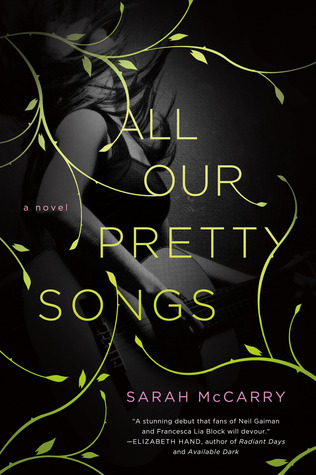The Internet can be a challenge for writers. We have to avoid its distractions while writing, only to be besieged with expectations that we will utilize it to promote our books. Writers are thrust into a semi-public life when we publish and have to contend with people saying all sorts of things about us and our books, which can be thrilling on the one hand and unnerving on the other.
How should writers navigate this world? I talked with Sarah McCarry, author of the brilliant novel All Our Pretty Songs, and blogging star at The Rejectionist.
Nathan: There are so many pressures on authors these days to be on the Internet, do all The Social Media, to promote your own books because you can’t necessarily count on your publisher, and oh by the way you have to write the books too, which is made all the more more difficult by all the distractions. Do you think writers are better off with social media and the Internet or are we all tweeting while Rome burns?
Sarah: Ha! You think because I am a Pessimist you can provoke me into a Franzenesque condemnation of the kids today and their platforms, but there you are mistaken, sirrah. I like to approach social media as a kind of mutual aid arrangement; I love promoting other people’s work and building connections with other writers and like-minded humans. But it’s definitely challenging to put on one’s little marketing hat and suddenly be all like ACTUALLY CAN EVERYONE PLEASE BUY MY BOOK, ALSO. I’m not very good at it, to tell you the truth. And I am somewhat suspicious of most of the more conventional social promotion activities that many publishers push, like blog tours and book trailers and goodreads giveaways and what have you–I mean, if you enjoy that stuff, absolutely do it, but I would be pretty surprised if many of those tactics had any real impact on book sales. I find my own energy is more usefully spent elsewhere.
Nathan: What I find interesting about your Internet presence is that you are someone who embraced social media very early and I originally met you because we were blog friends, and yet I know you to be very ambivalent at best about e-books, cell phones that do things other than tell time, and the multinational corporations that are speeding those things along. How do you differentiate between the types of technology to embrace and those to be wary of?




Sarah, thanks so much for your refreshing honesty. It's so good to hear someone else say that not following a writing schedule doesn't necessarily threaten our identity as writers, but that eventually we just have to write the book. I've managed to do that multiple times, and have had seven of them published by royalty-paying publishers (and that is a whole other argument), but the thing that continues to bug me is this social media emphasis. Thanks for putting it in perspective (sort of).
And thanks, Nathan, for letting us get to know Sarah a bit better.
(And sorry for the post just removed–wish we could just edit our comments when we find a misspelled word).
Sarah, you sound like a girl after my own heart! I've been online since the mid-90s with my own website(s), but I have no smartphone and I'm one of the 25% who will never go all eBook 😉
It is an interesting challenge trying to balance privacy versus being "accessible" and approachable enough in this Internet age to folks who may be interested in your writing.
Like Nathan, I do tend to skim long articles, but usually it's because I do all that reading online now. The internet is ideal for magazine/news articles, but I still end up skimming, in part to get through quickly, and in part because I'm online so much my eyes get tired.
But, as I mentioned, I also still enjoy books and I read those the same as I always have and I really hope we don't move into a trend of books being shortened or simplified to make them easier or faster to read. 🙂
I love Sarah's personality! And her book is pretty awesome too!
Sometimes you just have to scrape together what time you have and use it as best you can.
Sarah, I love you! I don't own a smartphone and have no intention of getting one, either. I also grapple with online honesty and how much to reveal. Mostly, however, I appreciate what you said about there being no one way to write. I swear, I am SO tired of reading blog posts title: 5 Way to Find Time to Write! 7 Steps to Write More Every Day! 9 Tips to Defeat Writer's Block!
Ahhhhh!
Thanks for the refreshing interview. You are totally my new girl crush writer.
I tried to be professional and PC with my online presence for the first good portion of it, but eventually passion took over.
Great "interview." Sarah rocks.
Great interview. Writing the books is the easy part. Now publishing them is easy, too. It's the marketing I dislike. I'm not crazy about ebooks either.
Nice interview and I have to say the weirdest conversations online have to do with 'writers' who don't read. It's like this: "Hey Fred, will you buy my book?" "Eve, I hate to admit it, but I don't read books." "Oh… but you just wrote one." "Yeah, will you buy it?"
Fantastic interview about a complex subject. I was able to separate my writing self from my personal self, but as I started doing more professionally (as school library staff) using my real name, my worlds have collided a bit.